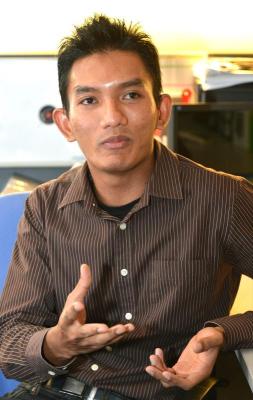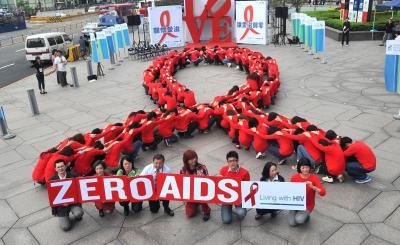By SHARMILA NAIR and ANGELIN YEOH
alltherage@thestar.com.my
YOU are HIV positive. Don’t touch us!” That is one of the taunts 13-year-old Alina has to endure every time she gets into an argument with her schoolmates.
“They promised they won’t tell anyone, but whenever we argue, that’s the first thing they point out,” said a Alina, a former street kid who was diagnosed with the virus at the age of five.
She contracted HIV from her drug-abusing mother, who had abandoned her years earlier. Now, Alina lives with other HIV positive children at Rumah Solehah in Cheras, Kuala Lumpur.
The musically talented teenager is aware of her condition, as she is often counselled during monthly clinical check-ups, but her biggest disappointment is that her friends aren’t.
“I am just like any other teenager but most of my schoolmates don’t see that. They sometimes shun me during recess and exclude me from their fun activities. I try not to take it to my heart, but it does hurt my feelings sometimes,” she said.
Despite being discriminated for her condition, Alina doesn’t want people’s pity, their kind words, or even their money. “I just want them to be aware and educate themselves with HIV/AIDS issues.”
According to statistics provided by the Malaysian AIDS Council (MAC), as of 2011, the number of people living with HIV (PLHIV) in this country is estimated at 79,855. One of them is Rahimi Radzi’s friend.
“When my friend found out he was HIV positive, he was devastated. He believed he didn’t have much time to live. He thought it was the ultimate death sentence,” said Rahimi, a student, during an interview at the MAC headquarters in Sentul, Kuala Lumpur.

Rahimi Radzi is fed up with the level of ignorance among youth on HIV/AIDS.
Rahimi added that a few of his friends started to keep their distance from that friend.
“Some of them thought they could get HIV/AIDS from breathing the same air as a PLHIV. That is not true and I was stunned at the reality that some people still think it’s possible.”
Instead of shunning his friend, Rahimi decided to take up the cause to advocate awareness on HIV and AIDS.
“I’m tired of people, and young people especially, not getting their facts about HIV and AIDS right. So I decided to be a part of the Red Ribbon Youth Club to teach youths the right way of protecting themselves from HIV/AIDS.”
Making youths matter
In Malaysia, more than 76% or 69,747 of the cumulative cases of HIV infection in 2010 were among the 20 to 39 age group.
Even more alarming is the fact that in 2011, young people aged 13-29 made up one of every four new HIV infections.
In a bid to empower the youth with correct information on HIV/AIDS, MAC launched the Red Ribbon Youth Club in September.
The club aims to be a platform for youths to equip themselves with accurate information on HIV/AIDS, and also encourage them to make full use of the information they have by sharing it with others. Since its launch, the Red Ribbon Youth Club has acquired almost 4,000 “Likes” on its official Facebook page.
Get the facts
Rahimi, a Red Ribbon Youth Club volunteer and facilitator, noted that young people are generally ignorant when it comes to HIV/AIDS issues.
“We’ve done road shows in public universities to assess the level of awareness among young people, and it’s sad to say most of them have either very low or almost zero knowledge on HIV/AIDS.”
He added that even knowledge on the “basics”, like how HIV can be transmitted, was surprisingly low among the young people he’s spoken to.
“Young people should also be aware that you cannot tell if a person has HIV/AIDS by looking at them. The only way to find out is through a blood test.”
He also said most young people have this perception that they are not at risk if they only have sex with one person.
“Unfortunately, there have been cases where a person gets HIV/AIDS after having unprotected sex with their partner for the first time. They were probably unaware that their partner has HIV/AIDS. Some have even got it from their spouses.
Meera Abi, an executive with MAC under the media department, said the best way of preventing HIV/AIDS is to practice safe sex and lead a healthy lifestyle.
“Prevention starts with the action you take for yourself and your partner – not discriminating against PLHIV.”

Meera Abi encourages young people to practice safe sex and lead a healthy lifestyle.
Overcoming stigma
However, young people are often shy when it comes to talking about safe sex, let alone HIV/AIDS.
“A lot of the young people we’ve spoken to at our road shows say they feel uncomfortable paying for condoms at pharmacies.
“They’ve had cashiers asking them personal questions like ‘Aren’t you a little too young for this?’ and ‘Are you married?’. Once faced with an experience like that, they’d rather forget about the condoms and just go on having sex without protection,” said Meera.
Instead of shying away from pharmacies, Rahimi said there are other places where youths can go for protection and counselling if they are concerned about getting HIV/AIDS.
“For example, NGOs such as the PT Foundation offer free and confidential HIV tests. At the MAC office, you can set up an appointment to speak to a counsellor about HIV/AIDS and learn how to use protection.”
Celebrate awareness
The Red Ribbon Youth Club will be celebrating World AIDS Day this weekend at Central Boulevard of Berjaya Times Square, Kuala Lumpur.

Dozens of volunteers join a human chain in the form of a red ribbon, a symbol of "love and care" for HIV and AIDS carriers worldwide.
The two-day event will see The Red Ribbon Youth Club teaming up with the Medical Students Society of Universiti Malaya, PT Foundation and Reckitt Benkinser (M) Sdn Bhd for a weekend of awareness and fund-raising activities.
“We encourage everyone to come and be a part of this event. There are booths where visitors can learn more about HIV/AIDS and we’ve got a loads of activities and entertainment lined up,” said Meera.
Rahimi added the youth have a huge role to play in helping to make the theme for this year’s World AIDS Day a reality.
“The theme for this year is ‘Getting To Zero’. We hope to achieve zero new infections, zero HIV/AIDS-related deaths and zero discrimination in the coming years. It might sound impossible but really, what matters is taking the necessary steps to raise awareness now, and this in turn will benefit us in the long run.”

Tell us what you think!